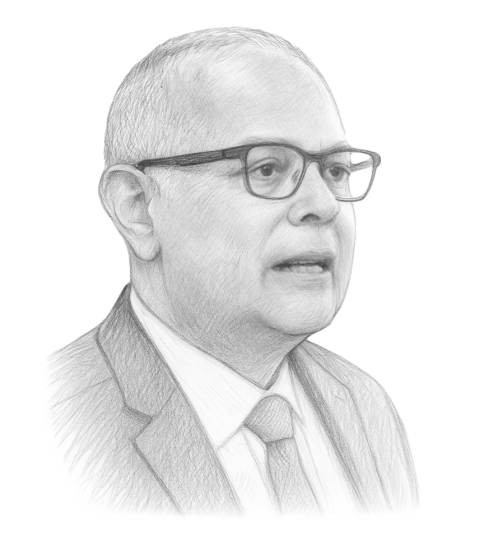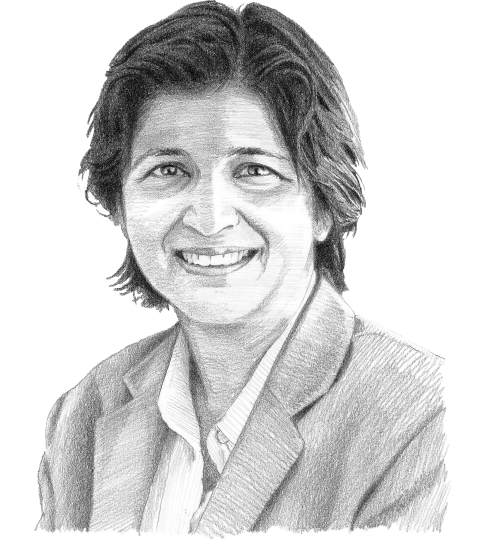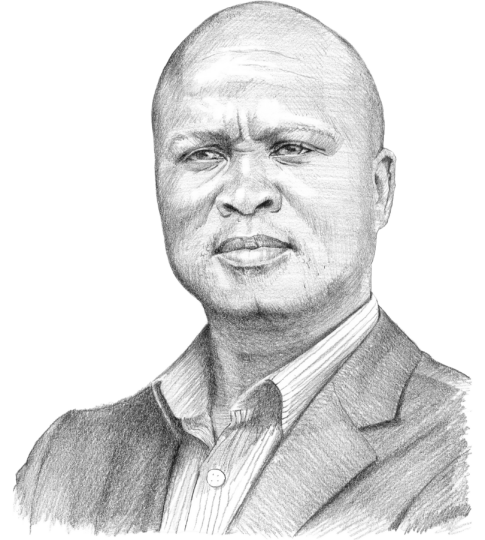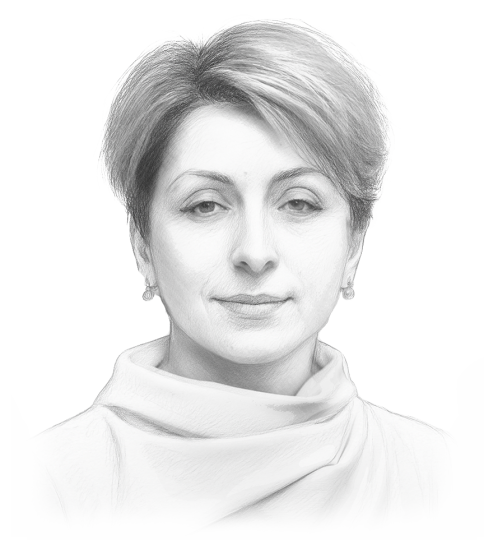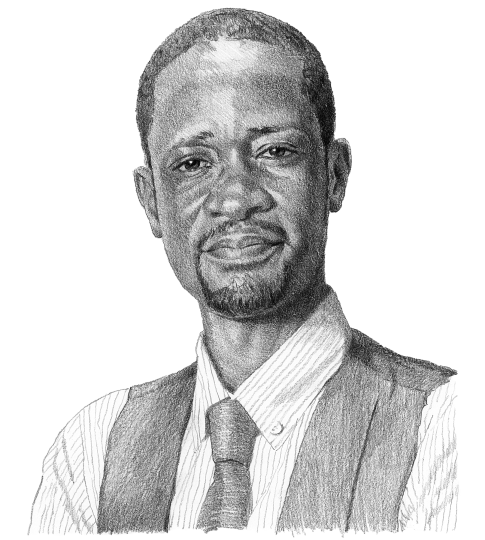Venezuela: Maduro’s end is near
After years of malicious activities and mounting crises, Caracas is facing international isolation and an unprecedented show of U.S. power and resolve.
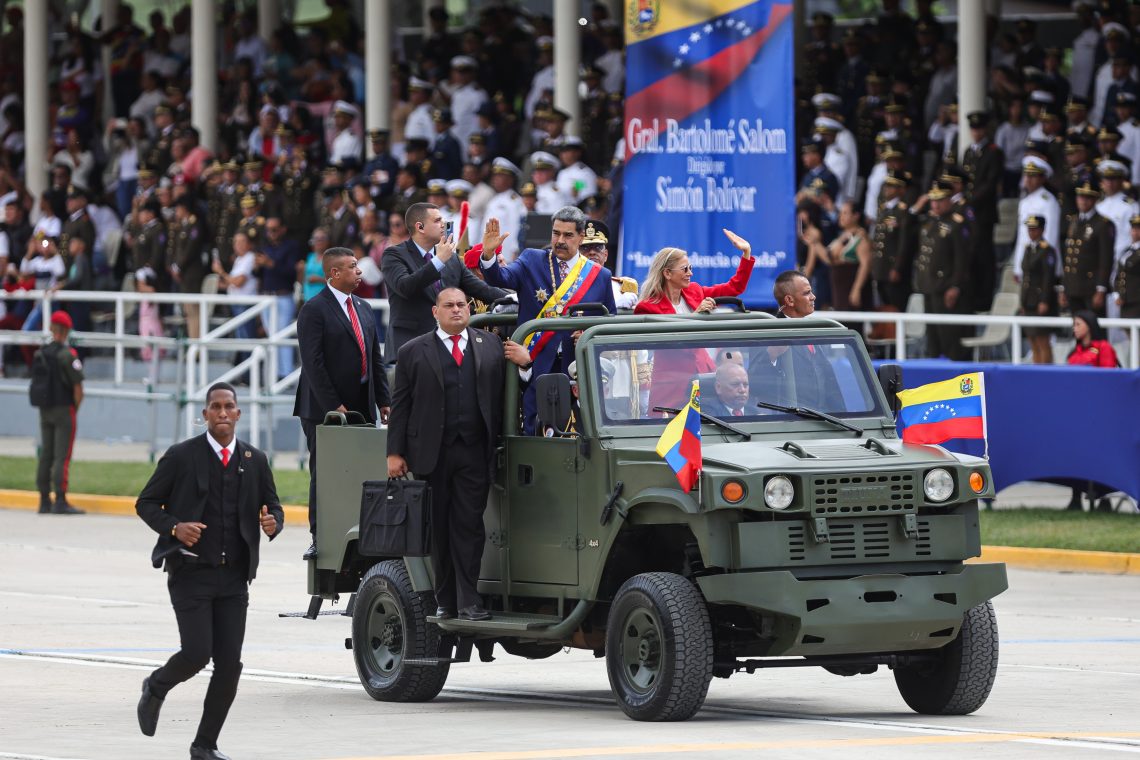
In a nutshell
- Fraudulent elections exposed Maduro’s dictatorship
- Venezuela suffers economic collapse, mass exile and human rights violations
- The U.S. is increasing pressure on Caracas to stabilize the hemisphere
- For comprehensive insights, tune into our AI-powered podcast here
One year after perpetrating electoral fraud, the Venezuelan regime faces multiple crises, including allegations of crimes against humanity, mass exile of citizens, economic collapse, accusations of promoting terrorism and drug trafficking. Caracas is now also confronted with the United States’ determination to bring President Nicolas Maduro to justice and improve hemispheric security.
What happened on July 28, 2024
On July 28, 2024, presidential elections were held in Venezuela, and the results were fraudulent. The opposition had previously accused the Venezuelan regime of stealing several elections, but this time, the fraud was proven. Late on election day, the opposition was able to access 85 percent of the official tally sheets and managed to publish the results on the internet in less than 48 hours for all the world to see. Opposition candidate Edmundo Gonzalez Urrutia had won the election by 4 million votes, equivalent to 40 percentage points over President Maduro.
It seemed that Mr. Maduro was about to fall, because the democratic governments of the West denounced the official results. Nevertheless, Russia, China and Iran, as well as the presidents of Cuba, Nicaragua and Honduras, all three of whom are members of the Sao Paulo Forum (SPF), recognized the results announced by the National Electoral Council, controlled by President Maduro.
Other SPF leaders, including Brazil’s Lula da Silva, Mexico’s Lopez Obrador and Colombia’s Gustavo Petro, maneuvered to minimize President Maduro’s fall, arguing that to take a position on the elections, it was necessary to wait for the electoral council to present the tally sheets, which never happened. This maneuver gave the Venezuelan regime time to initiate a fierce persecution of its opponents. President Maduro was exposed as a dictator and has since remained in power using brute force, for which he has the support of the military and the state security forces.
Charges of crimes against humanity
Since the election, numerous reports have been published accusing President Maduro and his allies of committing various crimes. Concrete examples include the “Report of the Independent International Fact-Finding Mission on Venezuela,” the “Inter-American Commission on Human Rights Report on Human Rights Violations in Venezuela in Electoral Context,”and the Casla Institute’s report on “The Crimes Against Humanity committed in Venezuela during 2024-2025.”
The Maduro regime has committed crimes against humanity since at least 2014, which has been reported to the International Criminal Court (ICC) with abundant evidence, though no decisions have been made in this regard. Recently, the court’s prosecutor, Karim Khan, was removed from the investigation because Mr. Maduro’s lawyer before the ICC, Venkateswari Alagendra, is Mr. Khan’s sister-in-law. Meanwhile, human rights violations in Venezuela continue. According to the non-governmental organization Foro Penal, at the beginning of August the country held 807 political prisoners.
Economic collapse
Economic statistics show the extent of President Maduro’s poor governance. Venezuela, once the richest country in the region, lost 80 percent of its gross domestic product (GDP) in eight consecutive years of recession between 2014 and 2021. In the first quarter of 2025 alone, Venezuela’s currency, the bolivar, lost 24.6 percent of its value against the dollar.
The Venezuelan regime recorded debt of 164 percent of the country’s GDP in 2024. The minimum wage has been frozen since March 2022 at 130 bolivars (equivalent to $1.48) per month. It is therefore not surprising that around 8 million Venezuelans have decided to leave the country, according to United Nations figures.
Additionally, U.S. President Donald Trump in March issued an executive order declaring that any country buying oil or gas from Venezuela would pay a 25 percent tariff on trade with the U.S., arguing that “the regime of Nicolas Maduro in Venezuela continues to pose an unusual and extraordinary threat to the national security and foreign policy of the United States,” which has led to a further drop in Venezuela’s income.
Drug trafficking and terrorism
In March 2020, during Mr. Trump’s first presidency, Attorney General William Barr charged President Maduro and 14 other Venezuelan officials with narcotrafficking and offered a $15 million reward for President Maduro’s capture. According to Mr. Barr, President Maduro and his codefendants were involved in a conspiracy together with the Revolutionary Armed Forces of Colombia (FARC) in an effort “to flood the United States with cocaine.”
According to multiple sources, including former security chief and current Minister of the Interior Diosdado Cabello, the Venezuelan regime and FARC reached an agreement to facilitate the Colombian guerrilla group’s drug business. This was the beginning of the “Cartel of the Suns,” a term used to describe drug trafficking cells embedded within the Venezuelan military. “Suns” is used to denote the insignias worn by high-ranking Venezuelan military officials; the American equivalent, for example, would be stars.
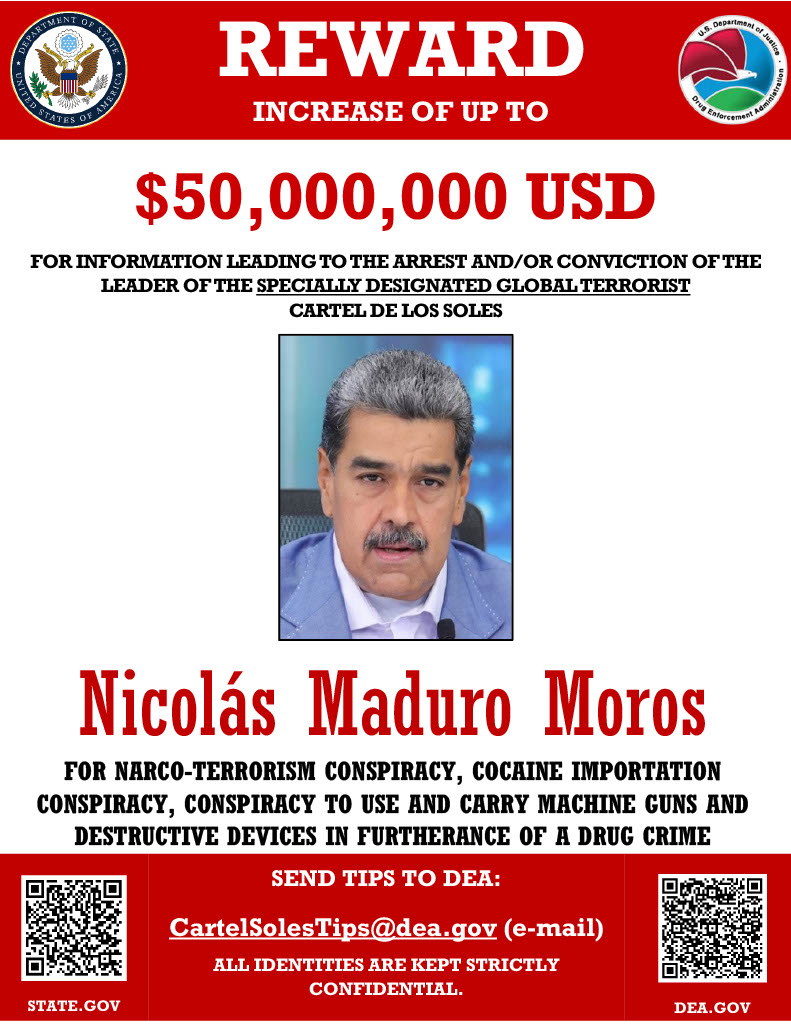
In January, the reward for President Maduro offered by the U.S. was increased to $25 million, and more recently, on August 7, the Department of State and the Department of Justice announced “a reward offer increase of up to $50 million for information leading to the arrest and/or conviction of Nicolas Maduro for violating U.S. narcotics laws.” It is the highest reward ever offered by U.S. authorities.
Also in January, President Trump designated the Tren de Aragua (TdA) group as a terrorist organization. TdA is Venezuela’s most powerful homegrown criminal actor and a terrorist gang that has successfully projected its power abroad. In March, the White House invoked the “Alien Enemies Act” against the TdA and accused President Maduro of being its leader.
The U.S. escalation against Maduro
Since late July, the Trump administration has escalated its offensive against Mr. Maduro and his allies. On July 25, the Department of the Treasury’s Office of Foreign Assets Control sanctioned the Cartel of the Suns as a Specially Designated Global Terrorist group, adding that it was headed by President Maduro.
On August 6, The U.S. Ambassador told the Organization of American States: “The Maduro regime is an enemy of humanity. The sham elections of 2025 were neither clean nor fair. Venezuela remains a priority for our hemisphere.” Attorney General Pam Bondi called President Maduro “one of the largest narcotraffickers in the world.” U.S. Secretary of State Marco Rubio in the same month said that actions by terrorist groups such as the Cartel of the Suns are a matter of national security and could result in the U.S. using its military power to neutralize the threat.
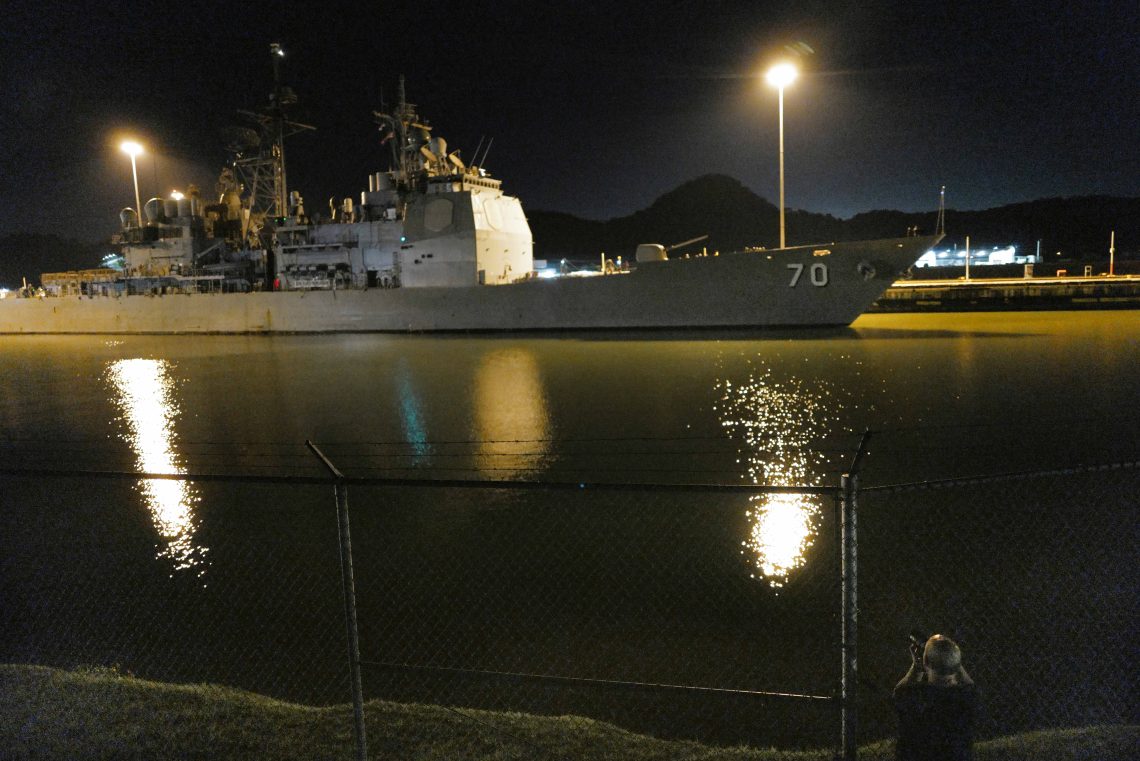
On August 8, President Trump’s administration authorized the military to go after Latin American drug gangs that have been designated as global terrorist organizations, including the Cartel of the Suns, and has directed the Pentagon to prepare options. Since mid-August, the U.S. has deployed as many as eight warships, a submarine, surveillance aircraft and other assets to the Southern Caribbean Sea and Pacific Ocean with an estimated 4,000 military personnel. On September 2, the U.S. conducted a strike against drug smugglers from Venezuela in international waters.
Why Venezuela?
After the fall of the Berlin Wall, late Cuban revolutionary leader Fidel Castro devised a plan to use Venezuela’s wealth and geopolitical influence to spread the Cuban revolution throughout Latin America, and even to the U.S. First Hugo Chavez and then President Maduro lent themselves to this plan, putting the Venezuelan state at the service of organized crime, of drug trafficking and of the enemies of the U.S.
Not only has the Cartel of the Suns become the distributor of 20 percent of the cocaine consumed in the Western Hemisphere, but the Venezuelan regime, as Russia and Iran’s main ally in Latin America, maintains close ties to Islamic terrorism. Mr. Maduro’s regime has supplied Venezuelan passports to Islamic terrorists so that they can easily travel to Europe and the U.S. It has also promoted destabilization in other Latin American countries, such as Ecuador, Chile and Colombia, and has developed new techniques for perpetrating electoral fraud, which have been exported to other nations.
In this sense, President Maduro has combined political action with drug trafficking and terrorism to deliberately cause harm to the U.S. It is a form of “hybrid warfare” that many believe justifies the U.S. reaction against President Maduro.
The straw that broke the camel’s back
On July 17, President Maduro and Colombian President Gustavo Petro announced the creation of a “binational economic zone” on the border, precisely where the guerrillas and drug traffickers have the most power. Although for now the agreement covers the Venezuelan states of Tachira and Zulia, and the Colombian department of Norte de Santander, it also contemplates the creation of other economic zones along the 2,219 kilometer-long common border.
Read more on Latin America
- Organized crime and security in Latin America
- Latin America caught between the U.S. and China
- Seven elections will determine the future of Latin America
Former Colombian President Alvaro Uribe (2002-2010) considered the agreement signed “with Maduro’s tyranny” to be “unacceptable” and argued that it represents “a step forward in handing over the country [Colombia] to international crime.” For its part, the National Federation of Business Entrepreneurs of Colombia (Fenalco) stated, “We are facing a situation that could lead to the creation of a large coca-growing gray area, outside the control of the Colombian state, and conducive to the strengthening of binational organized crime.” It was after this announcement that the U.S. government began its escalation against Maduro.
Scenarios
Most likely: Maduro loses power unwillingly
Growing pressure from the U.S. and the economic crisis gradually weaken President Maduro and create the conditions for a fracture within the regime and within the Venezuelan Armed Forces, leading to Mr. Maduro’s forced departure from power.
Less likely: Maduro negotiates an exit from power
Sectors of the Venezuelan regime, tainted by corruption but not involved in drug trafficking or terrorism, decide to negotiate an impunity agreement with the opposition and U.S. authorities, and then convince President Maduro to leave with his family and part of his wealth to a country where he can live in safety.
Consequences
Mr. Maduro’s fall, whether forced or negotiated, will result in the economic revitalization of Venezuela, a political reordering of Latin America and improvements to security in the Western Hemisphere.
Economics
Huge amounts of resources stolen by Chavismo, or left-wing, socialist populism associated with former Venezuelan President Hugo Chavez, during 25 years of corruption, will likely be recovered. On August 13, Attorney General Bondi told the Spanish-language news outlet Fox Noticias that U.S. agents have already seized $700 million belonging to Mr. Maduro, including two multimillion-dollar private jets, a mansion in the Dominican Republic, a horse farm, cars, jewelry and “multiple million-dollar homes in Florida.”
However, according to Transparencia Venezuela, the figure of $700 million in assets seized from President Maduro by the U.S. government is only a fraction of the list of 745 assets identified in 20 countries as having been obtained with dirty money, with a value of around $40 billion. This amount does not include assets not yet identified, estimated at more than a shocking $600 billion, that will come to light once Mr. Maduro is gone.
On June 12, Venezuelan opposition leader Maria Corina Machado presented a plan based on a $1.7 trillion growth strategy projected to triple the country’s GDP if implemented. Under a democratic and market-driven model, Venezuela is set for a transition from collapse to boom. Ms. Machado said the country would be transformed from a criminal hub to an energy hub.
Latin American politics
President Maduro’s downfall will have a cross-cutting effect on the region. Given that Venezuela is currently the hub of organized crime for the Americas, sensitive information will come to light about the shady deals and criminal activities between Mr. Maduro and his allies in the SPF, including Presidents Petro and Lula da Silva, all of which will impact the upcoming electoral processes in Latin America.
President Maduro has already caused a division within the SPF, because leaders of some countries, such as Cuba and Nicaragua, defend him openly, while others including Brazil, Colombia and Mexico support him indirectly. In stark contrast, the leaders of Chile and Peru call him a dictator.
President Maduro’s domestic and foreign allies will do their best to distance themselves from the Cartel of the Suns and the TdA, while they wait for President Trump’s term to end and better times to come for the left. If President Maduro is forced out, it will be more difficult to distance themselves, though if he negotiates his way out, they will be able to obtain better conditions to safeguard their political and economic capital.
Hemispheric security
Once the Trump administration designated the Cartel of the Suns a terrorist organization, the Paraguayan Senate and the Ecuadorian government followed suit. The fall of Mr. Maduro, its impact on the SPF and the electoral victories of the right, such as the one that just occurred in Bolivia and an expected victory of the right in Chile (election on November 16), will make it possible to form a regional alliance against organized crime and drug cartels. Some governments, such as those of Argentina and El Salvador, are already working closely with the U.S. on security issues. Other governments and presidential candidates with a chance of winning elections have also expressed their desire to collaborate with President Trump in his fight against the cartels. This trend will grow in the coming months, making the region a safer place, where Cuba, Russia and Iran will have less influence.
Contact us today for tailored geopolitical insights and industry-specific advisory services.
